The Chicano Studies Reader
AZTLN ANTHOLOGY SERIES
Las Obreras: Chicana Politics of Work and Family, edited by Vicki L. Ruiz (2000)
The Chicano Studies Reader: An Anthology of Aztln, edited by Chon A. Noriega, Eric Avila, Karen Mary Davalos, Chela Sandoval, Rafael Prez-Torres, and Charlene Villaseor Black (fourth edition, 2020)
I Am Aztln: The Personal Essay in Chicano Studies, edited by Chon A. Noriega and Wendy Belcher (2004)
Altermundos: Latin@ Speculative Literature, Film, and Popular Culture, edited by Cathryn Josefina Merla-Watson and B. V. Olgun (2017)
The Chicana/o Education Pipeline: History, Institutional Critique, and Resistance, edited by Michaela J. L. Mares-Tamayo and Daniel G. Solrzano (2018)
The Aztln Mexican Studies Reader, 19742016, edited by Hctor Caldern (2018)
AZTLN ANTHOLOGY SERIES, VOLUME 2
The Chicano Studies Reader An Anthology of Aztln, 1970-2019
Fourth Edition
Edited by
Chon A. Noriega
Eric Avila
Karen Mary Davalos
Chela Sandoval
Rafael Prez-Torres
Charlene Villaseor Black
UCLA Chicano Studies Research Center Press
Los Angeles
2020
Copyright 2001, 2010, 2016, 2020 by the Regents of the University of California. All rights reserved. Printed in the United States of America.
All rights reserved. No part of this book may be used or reproduced in any manner whatsoever without written permission, except in the case of brief quotations in critical articles and reviews. For more information, contact the UCLA Chicano Studies Research Center.
First edition 2001. Second edition 2010. Third edition 2016. Fourth edition 2020.
First e-book edition 2021.
Essays reprinted from Aztln: A Journal of Chicano Studies, introductions original to the edition.
Print edition
Library of Congress Control Number: 2019041056
ISBN 978-0-89551-172-0 (paperback)
Electronic edition
Library of Congress Control Number: 2021937568
ISBN 978-0-89551-200-0 (e-book)
CSRC Director: Chon A. Noriega
Senior Editor: Rebecca Frazier
Business Manager: Darling Sianez
Manuscript Editor: Catherine A. Sunshine
Design and Production: William Morosi
Cover illustration: Camilo Ontiveros, Temporary Storage: The Belongings of Juan Manuel Montes, 2017. Personal belongings, rope, metal sawhorses, aluminum base, and wooden sculpture, 12 feet high. 2017 by Camilo Ontiveros. Image courtesy of the artist.
Library of Congress Cataloging-in-Publication Data
Names: Noriega, Chon A., 1961- editor.
Title: The Chicano studies reader : an anthology of Aztln, 1970-2019 /edited by Chon A. Noriega [and five others].
Other titles: Anthology of Aztln, 1970-2019
Description: Fourth edition. | Los Angeles : UCLA Chicano Studies Research Center Press, 2020. | Series: Aztln anthology series ; volume 2 | Includes bibliographical references and index. | Summary: An anthology of articles from Aztln: A Journal of Chicano Studies, published between 1970 and 2019. The fourth edition includes a new section on Chicana/o and Latina/o youth.--Provided by publisher.
Identifiers: LCCN 2019041056 | ISBN 9780895511720 (paperback)
Subjects: LCSH: Mexican Americans. | Mexican Americans--Study and teaching (Higher)
Classification: LCC E184.M5 C458 2020 | DDC 973/.046872--dc23
LC record available at https://lccn.loc.gov/2019041056
 The paper used in this publication meets the minimum requirements of the American National Standard for Information SciencesPermanence of Paper for Printed Library Materials, ANSI Z39.48-1992.
The paper used in this publication meets the minimum requirements of the American National Standard for Information SciencesPermanence of Paper for Printed Library Materials, ANSI Z39.48-1992.
UCLA Chicano Studies Research Center
193 Haines Hall
Los Angeles, California 90095-1544
www.chicano.ucla.edu
Distributed by the University of Washington Press
PO Box 50096
Seattle, Washington 98145-5096
www.washington.edu/uwpress
CONTENTS
Preface to the Fourth Edition
This fourth edition of The Chicano Studies Reader commemorates the fiftieth anniversary of Aztln: A Journal of Chicano Studies, whose first issue was published in 1970, and of the UCLA Chicano Studies Research Center, which was established in 1969. It is dedicated to the many people who have worked on the journal and who have helped realize its contributions to Chicana/o/x studies and the Chicana/o/x community. Since its inception, Aztln has been the product of many people who have dedicated themselves to its goals, especially founding editors Juan Gmez-Quiones, Roberto Sifuentes, Reynaldo Macias, Deluvina Hernandez, and Teresa McKenna. Raymund Paredes guided Aztln into the 1990s, establishing the journals current cover design, which features the work of Chicana and Chicano artists. From 1996 through 2016, I was fortunate to follow in the footsteps of these scholars and to be able to contribute to the ongoing history of the journal. Since 2016, Charlene Villaseor Black has helped advanced the journal as its current editor. For over a decade, Managing Editor Wendy Belcher was a crucial and dynamic force in helping to return the journal to a regular publishing schedule and re-establish our book publications program. I have no doubt that without her Aztln would not have made it to the twenty-first century. Today, Rebecca Frazier continues her legacy, overseeing greatly expanded publication activities that include three book series, exhibition catalogs, and a media arts series. We both owe a debt of gratitude to the staff and consultants who make Aztln possibleHeather Birdsall, Kevin Cruz, William Morosi, and Catherine S. Sunshineas well as to the past and current editorial boards and staff.
Raymund Paredes first raised the idea for this anthology and held preliminary meetings with faculty in the mid-1990s. I am grateful to the books editorial teamEric Avila, Karen Mary Davalos, Rafael Prez-Torrez, Chela Sandoval, and (with this edition) Charlene Villaseor Blackfor their hard work, thoughtful selections, and informed appreciation for the journals history. The fourth edition adds seven essays as part of a new section at the end of the anthology that was curated by Villaseor. This section reconsiders Chicano studies from the vantage point of children and youth. In general, The Chicano Studies Reader respects the terminology that was used when the essays were first published, but, as with Aztln, it also documents the changes in self-identification, both over time and across contexts: Chicano, Chicano/a, Chicana/o, Chican@, Chicanx, Chicana/o/x, as well as variations on pan-Latino terminology. The one constant is that culture always changes and the differences along the way help define what is at stake with respect to identity, recognition, rights, access, justice, and equity. We favor choices, and respect history, but are always mindful that whatever we call ourselves, for many we never stop being anything other than stereotypical Mexicans.
The cover art for this new edition of The Chicano Studies Reader provides a material counterpart for the way in which Chicana/o/x youth have been both objects of unthinkable discrimination as well as effective agents for social change. In

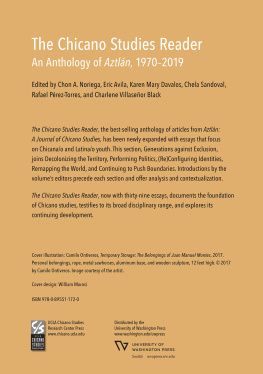

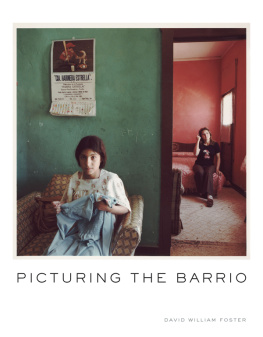
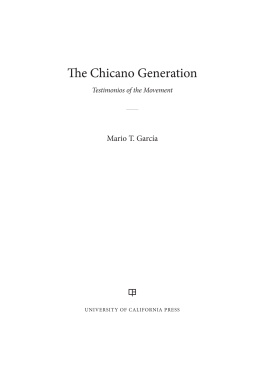
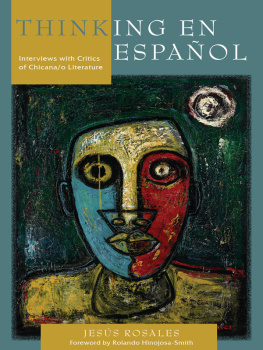
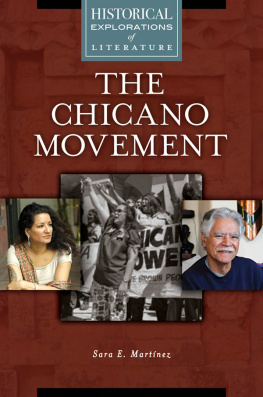
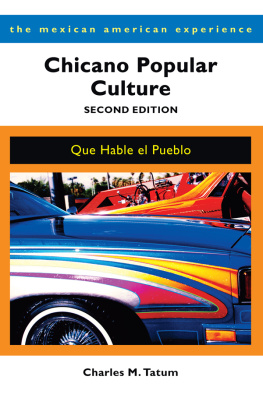
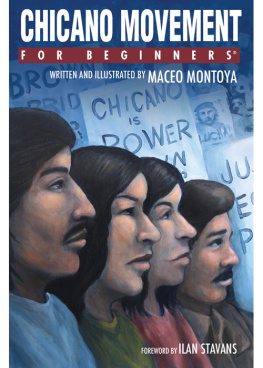
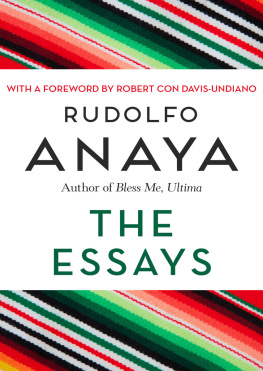

 The paper used in this publication meets the minimum requirements of the American National Standard for Information SciencesPermanence of Paper for Printed Library Materials, ANSI Z39.48-1992.
The paper used in this publication meets the minimum requirements of the American National Standard for Information SciencesPermanence of Paper for Printed Library Materials, ANSI Z39.48-1992.
